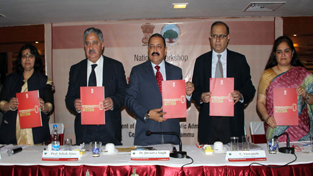
Excelsior Correspondent
JAMMU, Nov 12: Union Minister of State (Independent Charge) for Development of North Eastern Region (DoNER), MoS PMO, Personnel, Public Grievances, Pensions, Atomic Energy and Space, Dr Jitendra Singh has called upon the State Governments, including the Government of Jammu & Kashmir, to emulate the Centre’s path-breaking administrative reforms introduced over the last two years of the Modi Government. He said, while some of the States have been quick to adopt these reforms in governance, some of the other States have been slow to move, but are being constantly persuaded to move ahead expeditiously.
While addressing the special session of the two-day workshop organized by the Union Ministry of Personnel, Department of Administrative Reforms and Public Grievances (ARPG) here today, Dr Jitendra Singh said, the Modi Government has, in a short span of over two years, demonstrated its commitment to live up to the dictum of “maximum governance, minimum government” with citizen-centric approach and hoped that some of the States, which are yet to evolve to the higher standards of best practices in governance, would soon pick up the queue and follow.
Dr Jitendra Singh congratulated the Union Ministry of Personnel and the Central University of Jammu headed by Vice Chancellor Prof. Ashok Aima for having come forward to organize this, first-of-its-kind, event in Jammu, where senior secretaries and officers from over 20 States of India will be sharing their experiences in governance, administration and particularly on the theme of “Right to Services Act”.
Dr Jitendra Singh recalled that soon after independence, the India’s Civil Services were planned on the pattern of the British Indian Civil Services (ICS), but added that there is a huge difference between the two. For example, he said, a British head of district was known as “Collector” and was expected to collect revenue for the Empire, whereas the head of district in independent India is designated as District Development Commissioner (DDC) and is expected to generate revenue for public welfare. Not only this, in an open democracy like ours, he said, each day the bureaucrats and administrative officers are subject to increasing accountability, increasing transparency and increasing scrutiny, both by media as well as the public.
In the last two years, Dr Jitendra Singh said, he was proud to note that the Department of Personnel & Training (DoPT) and Department of Administrative Reforms and Public Grievances (ARPG) have managed to place virtually every possible information in public domain. The situation today is such, he said, that an IAS officer who is promoted or transferred, does not wait to receive the personal copy of his order, but he is able to access it on the website on real-time basis. Not only this, even the decisions taken at the highest level including ACC headed by Prime Minister are available at the website on real-time basis.
Referring to some of the revolutionary decisions taken during the last two years, Dr Jitendra Singh mentioned the decision to do away with attestation of certificates by Gazetted Officer. Such a decision, he said, also sent out a message that this Government has the capacity to trust the youth of this country. Unfortunately, however, he regretted that some of the State Governments took almost two years to adopt the reform of self-attestation.
Another revolutionary decision taken by the Modi Government, Dr Jitendra Singh said, is abolition of interviews for appointment to posts at junior levels. This has not only provided level-playing field for youth from all kinds of socio-economic backgrounds but has also eliminated the scope for favoritism and nepotism, he said. However, he regretted that some of the State Governments have still not adopted this reform which only exposes them to the accusation that they have vested interest in continuing the practice of interviews in order to leave room for manipulation.
Dr Jitendra Singh also complimented the Department of Administrative Reforms & Public Grievances (ARPG) headed by him for having activated the Grievance Cell in Government of India and recorded 100% disposal rate of grievances. Again, he called upon some of the State governments to activate their grievance cells because sooner or later, the public would place them under the pressure to do so.
Dr Jitendra Singh hoped that the exchange of views on the “Right to Services Act” during the two-day workshop will offer valuable cues to increase citizen participation in governance. He said while the Modi Government follows the approach of zero tolerance towards corruption, it is, at the same time, careful to ensure that honest and performing bureaucrats are not intimidated and one of the evidences is the “Prevention of Corruption (Amendment) Act” to be brought up in the next Session of the Parliament which would provide every officer at every level the privilege for permission before being prosecuted.
In his welcome address Vice Chancellor, CUJ, Prof Ashok Aima appreciated the DARPG for associating with the University to hold this significant nationwide workshop. He also highlighted the role of universities in supporting public policy making and Government proceedings.
C Viswanath, Secretary, Department of Administrative Reforms and Public Grievances in GoI in his address said the main plank of present government is good governance. The Prime Minister has given instructions and these are being carried on, he added.
A presentation on the right to services Act and its implementation in the State was given by Nand Kumaram, Executive Director, State Agency for Public Services, Madhya Pradesh. The vote of thanks was proposed by Sumita Dasgupta, Director, DARPG.

